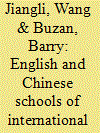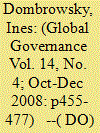|
|
|
Sort Order |
|
|
|
Items / Page
|
|
|
|
|
|
|
| Srl | Item |
| 1 |
ID:
131992


|
|
|
|
|
| Publication |
2014.
|
| Summary/Abstract |
This article compares the academic histories of the so-called 'Chinese School' and the English School in the six dimensions of origin, founders, and organization; naming; context; aims/intentions; theory sources; and historical projects. The English School is mature enough to present fairly clear contents for each section, but as the Chinese School is much newer and still hotly contested as a concept, many things about it are uncertain and controversial; it lacks a single defining concept or frame. The opportunity at hand, therefore, is to apply the experience of the English School to the formative process of a Chinese School or schools, at the same time making clear the considerable differences that time, place and circumstance make to the two projects. The article concludes by looking at possible lessons for the development of International Relations (IR) theory in China, both from what the English School has accomplished and for which it has been criticized. Along the way we provide a bibliographical introduction to both projects.
|
|
|
|
|
|
|
|
|
|
|
|
|
|
|
|
| 2 |
ID:
085328


|
|
|
|
|
| Publication |
2008.
|
| Summary/Abstract |
In recent years an emergent global policy discourse has promoted the concept of Integrated Water Resources Management (IWRM) as a strategy for the sustainable management of international waters. However, integration remains a considerable challenge in large international river basins. This article addresses the relevance of the global discourse on IWRM, asking how much integration can be expected and how much integration is desirable in international water management. The article presents a novel compilation of eighty-six international river basin organizations and examines their degree of integration in terms of three dimensions: membership, substantive scope, and form. More particularly, the article examines the integration problem from an economic perspective, asking whether integration serves the self-interest of the respective riparian states. The empirical evidence highlights the difficulties of integration, as the majority of international river basin organizations remain narrow in membership and scope. Economic considerations suggest that voluntary cooperation in river basins is institutionally demanding and that the degree of integration depends on the problem at hand. Hence, the challenge for international waters management is to search for the economically desirable degree of integration in each case.
|
|
|
|
|
|
|
|
|
|
|
|
|
|
|
|
| 3 |
ID:
130296


|
|
|
|
|
| Publication |
2014.
|
| Summary/Abstract |
Recent global policy attention to "land grabs" by international investors while very important, has diverted attention away from two other process that may be even more fundamentally affecting Africa's economic development trajectory: (1') the pace of land acquisitions by medium-scale African investors, who non-' control more land than large scale foreign investors in each of the three countries examine in this study (Ghana Kenya, and Zambia); and (ii) the overall impact of land transections on the viability of African governments' agricultural strategies, which for the most part remain predicated on smallholder led development and will require the expansion of cropland by smallholder household in Zambia and Ghana
|
|
|
|
|
|
|
|
|
|
|
|
|
|
|
|
|
|
|
|
|